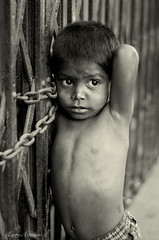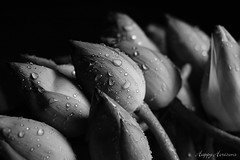Old people, people in old age homes , dying people, AIDS patients, child workers etc .
It seems to me that to be considered as a 'serious photographer' you need to touch upon this syllabus at least.
Is the above statement true? I personally don't think so.
Being a photojournalist is not easy ... Its a lot about being involved in the things you see around you....This involvement could lead to disturbing thoughts at times.. I had this feeling once when I had shot this image

and every-time i see it.. I have the same haunting feeling.. I remember not shooting for days after that ... Many lives are changed because of the photograph. That one shot could give a photographer his stardom, but at the same time it also could end up in getting help for the subject and the surroundings. More often than not, its that one photograph or one shoot that changes ones life forever.
I have been so influenced by this person James Natchwey.. that I am again bringing his name up.. have a look at this TED talk
from the timeline 00:48 to 02:53 especially.
In another of his talks, he says this
The worst thing is to feel is that as a photographer I am benefiting from someone else's tragedy. This idea haunts me. Its something I have to reckon with everyday because I know, that if i ever really allow our genuine compassion to be overtaken by personal ambition; I will have sold my soul. The only way I can justify my role is to have respect for the other person's predicament. The extent to which I do that is the extent to which I become accepted by the other and to that extent I can accept myself."
The one thing that I really like about being a photographer is the fact that your vision changes. This could be for the good things, but could be the sad things as well.
You tend to become aware of your surroundings. There is certain level of association that you develop with the things around you. Being a photographer I feel its important to be aware / good at both extremes of things around us...
Any art form is known to generate a expression in a viewer, as discussed in the previous blogs... and numerous of those expressions combine together to form experience. Many a time we often tend to denote the beautiful things as being aesthetical and we tend to enjoy viewing it. Thus aesthetics becomes a parameter that invokes a positive feeling. However what about a war photograph / aids/ street children? Does it not evoke a feeling? There is .. only that in this case its more of a negative feeling.. feelings of sorrow, remorse, pity and a sense of feeling bad.
This feeling also cannot be neglected and one cannot capture any of those essence if one is not prepared to undergo those feelings.
So are these photographs not aesthetical ?
A photograph of a flower is aesthetical but so is a photograph of a Afghan girl and equally aesthetical is a street photo by Henri.
I like what James Natchwey mentions in his site called Witness
"I have been a witness, and these pictures are my testimony. The events I have recorded should not be forgotten and must not be repeated."
Being a photojournalist is not easy. Its a way of life. Being able to feel the same pain is an essential entity. Thousands of photographers attempt the themes as mentioned by Vinayak, but i am sure most drop out.
There is another aspect to it. There are many who would argue... that in those places there could be an atmosphere of positivity, and one could try capturing that. Its like trying to find the smiles in the sad faces...But we all know... as photographers we tend to bring in exactly what is mentioned above...i.e. ..the whole debate in our minds about the genuine compassion versus the personal ambition.
Photographers who go on to become world know would have perhaps put their genuine compassion over personal ambition. Again its important to mention that its not that only the war / aids/ poverty etc photographers become famous. We all quote Ansel Adams frequently, wonder how many pictures of sorrow he took in-order to become famous? And do we know him by that ...
This "genuine compassion" can be for flowers or people or war photographs.

In the end Photography, as all agree is that its subjective.
The human psyche is such that it tends to develop an interest in unfamiliar things. What slowly starts as a inquisitiveness to capture the world we are unfamiliar of, becomes a thing that could end up changing out lives.
This develops into a compassion and then into a determination to show to the world a thing that we feel and showcase our felt experiences through the medium of photography.
The point I am trying to make it, as long as that compassion is maintained, I think its SERIOUS enough.
Photographs have the power to change human lives. I am sure it would have done to many of us already. Photographers have this unique vision within them to show to the world something that they are not aware of...

No comments:
Post a Comment